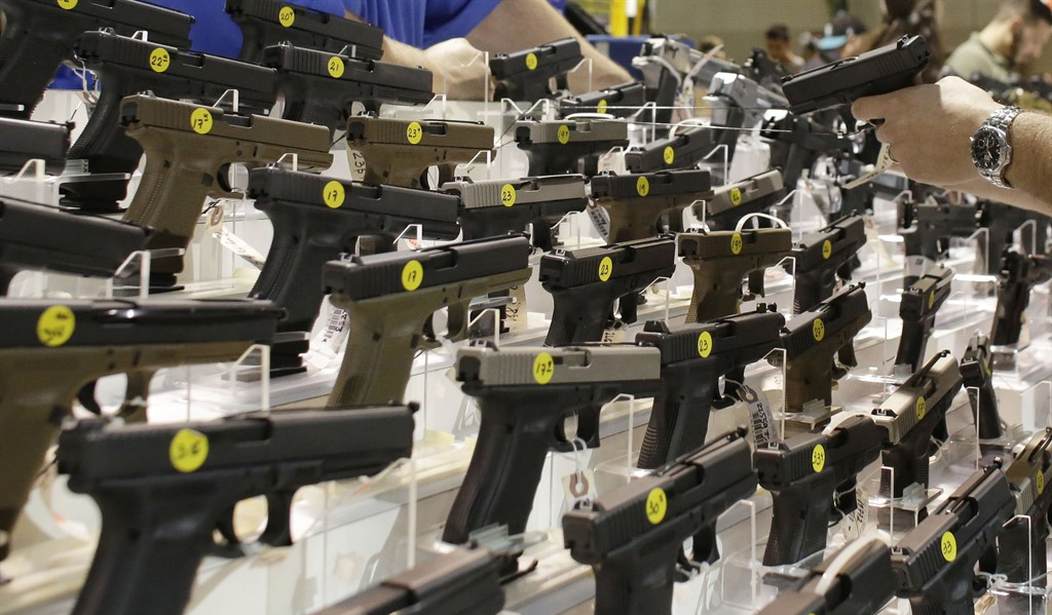Is it “inappropriate” to point out the racist roots of North Carolina’s pistol purchase permit law? Is it “disingenuous” to acknowledge that even today Black applicants in Wake County, North Carolina are almost three times as likely to be denied their ability to purchase a handgun compared to White applicants?
Apparently so, at least according to Becky Ceartas, the executive director of North Carolinians Against Gun Violence. She, along with Marcus Bass, deputy director of the NC Black Alliance, argue in a new op-ed that Second Amendment supporters like North Carolina Lt. Gov. Mark Robinson and Grassroots North Carolina’s Paul Valone are “race-baiting” with their objections to the law and Gov. Roy Cooper’s veto of a bill that would have repealed the pistol purchase permit requirement completely.
The reality is that African Americans in North Carolina are disproportionately impacted by gun violence, which is the leading cause of death for Black children and young men in the state. Though Black, Non-Hispanic North Carolinians comprised 22.1% of the 2018 N.C. population, they experienced 67.1% of the firearm homicide deaths. This violence is the result of systemic inequities and racism, compounded by firearms that are often trafficked into the most impacted neighborhoods. Our pistol permitting system helps to prevent the diversion of illegal firearms into the communities most suffering from daily gun violence. It helps reduce the racial disparities of gun homicides and it saves countless lives. We shouldn’t take away one of the few laws that disproportionately saves Black lives from gun violence.
If the Black population in North Carolina is disproportionately impacted by gun violence, it seems odd to argue that the pistol purchase permit law is actually effective at saving Black lives, doesn’t it? To me that’s more of an argument for the law’s repeal, since its clearly not doing much to prevent illegal access to firearms.
If lawmakers truly cared about addressing racial disparities they would support the Governor’s budget proposal to invest millions in criminal justice reform efforts to address the legacy of racist policies in North Carolina, including $15 million to fund community violence intervention programs. And they would oppose blatant efforts to disenfranchise Black voters.
Let us be clear, opposition to the Pistol Purchase Permitting law is not based on a desire to promote racial equity; it is based on a desire to appease the gun lobby. But the effect would be the same: the weakening of North Carolina’s gun safety laws at a time when we most need them.
It’s absurd for Ceartas and Bass to argue for “community violence intervention programs” at the same time they’re making it easier for police to arrest and charge someone for possessing a pistol without a purchase permit. On the one hand, the pair say they want to address “the legacy of racist policies” in the state, while doing all they can to keep those policies in place.
The most telling part of Ceartas’ and Bass’ op-ed is what the two don’t talk about; the racist intentions behind the pistol purchase permit law and the disproportionate impact still felt today. They simply refuse to acknowledge the fact that the law was put in place in 1919, at the height of the KKK’s resurgence and while riots were breaking out across the country.
In the summer of 1919, race riots would break out in Washington, D.C.; Knoxville, Tennessee; Longview, Texas; Phillips County, Arkansas; Omaha, Nebraska and–most dramatically–Chicago. The city’s African American population had increased from 44,000 in 1909 to more than 100,000 as of 1919. Competition for jobs in the city’s stockyards was particularly intense, pitting African Americans against whites (both native-born and immigrants). Tensions ran highest on the city’s South Side, where the great majority of Black residents lived, many of them in old, dilapidated housing and without adequate services.
There were 83 lynchings in 1919, including a 23-year old World War I veteran who was brutally murdered by a mob in Franklin, North Carolina in December of that year. As the local paper reported at the time:
The body of Powell Green, who was lynched last night for the murder of R.M. Brown, a prominent man of this place, was found swinging to a small pine tree about one and one-half miles from here this morning, beside the Capital Highway. His body was riddled with bullets, and otherwise showed rough handling.
… The town is quiet, and no further trouble is anticipated.
Let me be clear: North Carolina’s pistol purchase permit law was put in place in large part to prevent men like Powell Green from owning a pistol to protect themselves, even if the public arguments were often quite similar to the ones made by gun control activists today; that the public would be safer if sheriffs had the authority to deny pistol purchase permits to those they deemed unsuitable. Becky Ceartas and Marcus Bass may not want to acknowledge that fact, but they can’t change history. Instead, they have the power to help change the present, but rather than support the repeal of a racist Jim Crow law that even North Carolina sheriffs are ready to scrap, North Carolina’s gun control lobby fought to keep the law in place.
The pair can argue all they want that North Carolina will be safer as a result, but I live in neighboring Virginia, where we don’t have a pistol purchase permit law in place and both our violent crime and homicide rates are lower than they are in North Carolina. You don’t need a Jim Crow-era gun control law to have a safe society, and as North Carolina’s crime rates indicate, the racist gun laws still in place aren’t actually as effective at preventing crime as their supporters claim they are.








Join the conversation as a VIP Member